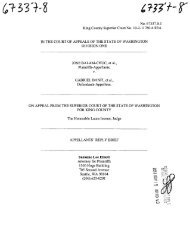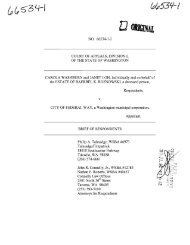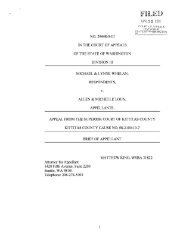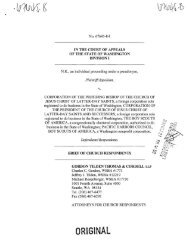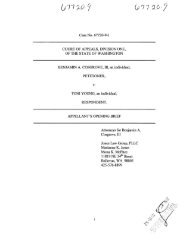Appellants' Reply Brief - Washington State Courts
Appellants' Reply Brief - Washington State Courts
Appellants' Reply Brief - Washington State Courts
You also want an ePaper? Increase the reach of your titles
YUMPU automatically turns print PDFs into web optimized ePapers that Google loves.
For example, a bookstore owner who operates a "brick and mortar"<br />
bookstore could claim as wages his gross sales under Malang's hyper-<br />
inflated wage theory, because he earned and owned the money that he<br />
eventually used to operate his store, i.e., in purchasing his retail stock and<br />
making an array of other business expenditures. Malang's theory fails<br />
because in order for the owner to generate those sales he has to incur<br />
expenses for such things as rent or purchase of a building, electricity to<br />
light and heat the store, books to sell, advertising, cash registers, and the<br />
cost of labor to help make the sales. While the business owner has<br />
discretion over many of these expenditures and decides how lavish or<br />
Spartan his business will be run, the amount of money that the owner<br />
actually expends to make his sales is not income or wages to the owner but<br />
instead, for purposes of RCW 5 1.08.178, represent the non-wage element<br />
of the gross receipts of the business.<br />
Board decisions helping to demonstrate the absurdity of Malang's<br />
position include In re Howard Fisher, BIIA Dckt. No. 00 21778 (January<br />
25, 2002) (farmer in self-employment) and In re Jerry Uhri, supra<br />
(convenience store owner). As just explained, common sense dictates the<br />
conclusion that it is absurd to consider gross receipts of a farmer or<br />
convenience store owner as the equivalent of wage for that sole proprietor.<br />
The dollar figures for gross receipts vs. business expenditures in the



